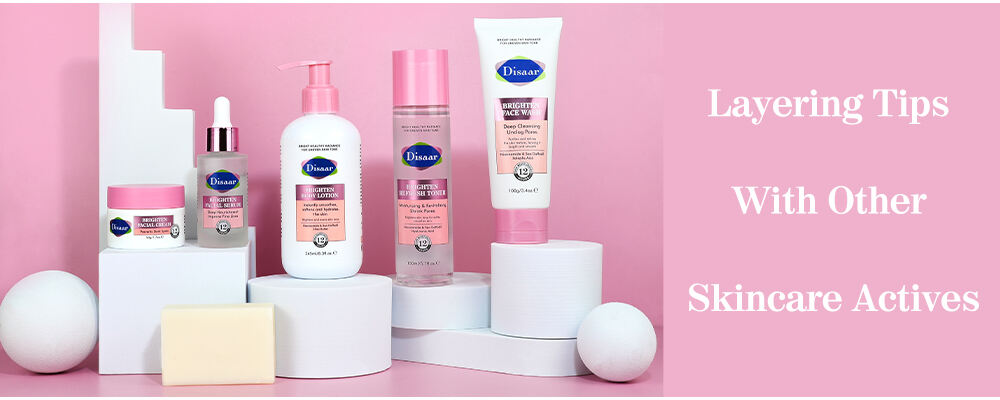Niacinamide , ທີ່ຍັງຮູ້ຈັກໃນຊື່ Vitamin B3, ແມ່ນວິຕາມິນທີ່ລະລາຍໃນນ້ຳໄດ້ ເຊິ່ງມີຄວາມສຳຄັນຕໍ່ການຜະລິດພະລັງງານໃນຂະບວນການຂອງເຊລ. ມັນມີບົດບາດສຳຄັນໃນການຊິນໂຊມ DNA ແລະ ການເຜົາຜານໄຂມັນ, ພະຍາບານ, ແລະ ໂປຣຕີນ, ພ້ອມທັງມີຄຸນສົມບັດຕ້ານອະນຸມູນອິດສະຫຼະຢ່າງຫຼວງຫຼາຍ. ການຄົ້ນຄວ້າໄດ້ສະແດງໃຫ້ເຫັນເຖິງປະສິດທິພາບຂອງ Niacinamide ໃນການຫຼຸດຜ່ອນບັນຫາຜິວຫຼາກຫຼາຍ ໂດຍສະເພາະຍ້ອນຄວາມສາມາດຂອງມັນໃນການເຈາະເຂົ້າສູ່ຊັ້ນຜິວ ແລະ ສົ່ງຜົນຕໍ່ກິດຈະກຳຂອງເຊລ. ລັກສະນະທີ່ລະລາຍໃນນ້ຳໄດ້ຂອງມັນເຮັດໃຫ້ມັນຖຶກດູດຊຶມ ແລະ ນຳໃຊ້ໂດຍຜິວໄດ້ຢ່າງງ່າຍດາຍ, ສະໜອງປະໂຫຍດດ້ານຜິວຫຼາກຫຼາຍໂດຍບໍ່ມີຜົນກະທົບທີ່ຮຸນແຮງ ຫຼື ກະຕຸ້ນ.
Niacinamide ແມ່ນສ່ວນປະກອບທີ່ມີຄວາມເຂັ້ມແຂງໃນຜະລິດຕະພັນດູແລຜິວໜັງ, ຮູ້ຈັກກັນດີໃນການຊ່ວຍສົ່ງເສີມການເຮັດວຽກຂອງຜິວ ແລະ ພັດທະນາຮູບລັກສະນະຂອງຮ່ວງຜິວ, ຄວາມຍືດຫຍຸ່ນຂອງຜິວ ແລະ ສີຜິວໂດຍລວມ. ສ່ວນປະກອບນີ້ຊ່ວຍເສີມຂະຫຍາຍຊັ້ນປ້ອງກັນຂອງຜິວ, ສ້າງເປັນຊັ້ນປ້ອງກັນຕໍ່ຕ້ານກັບສິ່ງເຄັ່ນຂວົກເຄັ່ງທາງສິ່ງແວດລ້ອມເຊັ່ນ: ມົນລະພິດ ແລະ ລັງສີ UV, ສະນັ້ນຈຶ່ງຊ່ວຍຮັກສາຄວາມຊຸ່ມຊື່ນ ແລະ ປ້ອງກັນການບາດເຈັບ. ການສຶກສາທາງດ້ານຢາໄດ້ຢືນຢັນວ່າການໃຊ້ Niacinamide ຢ່າງຕໍ່ເນື່ອງສາມາດນຳໄປສູ່ການປັບປຸງທີ່ສັງເກດເຫັນໄດ້ໃນເນື້ອຜິວ ແລະ ສີຜິວ. ຄວາມສາມາດໃນການປັບຕົວຂອງມັນເຮັດໃຫ້ມັນເໝາະສົມກັບທຸກປະເພດຜິວ, ຊ່ວຍໃຫ້ໄດ້ຜິວທີ່ມີສົ້ນໃສ, ສົດຊື່ນ ໃນຂະນະທີ່ແກ້ໄຂບັນຫາທົ່ວໄປເຊັ່ນ: ຜິວແດງ, ຮູຂຸມຂຸນໃຫຍ່ ແລະ ສີຜິວບໍ່ສະເໝີ.

Niacinamide ທີ່ຮູ້ຈັກກັນໃນຊື່ Vitamin B3 ມີປະສິດທິພາບໃນການຫຼຸດຜ່ອນຈຸດດຳດ້ວຍການຍັບຍັ້ງການຖ່າຍໂຍນ melanin ການສົ່ງຜ່ານ melanosomes. Niacinamide ສາມາດຫຼຸດຜ່ອນການຜະລິດ melanin ຢ່າງເກີນຂອບເຂດ ເຊິ່ງເປັນປັດໄຈຕົ້ນຕໍໃນການເກີດ hyperpigmentation. ການຄົ້ນຄວ້າທາງດ້ານຢາໄດ້ສະແດງໃຫ້ເຫັນວ່າການໃຊ້ Niacinamide ຢ່າງຕໍ່ເນື່ອງສາມາດນຳໄປສູ່ການຫຼຸດຜ່ອນຈຸດດຳຢ່າງສັງເກດເຫັນໄດ້ ເຊິ່ງຊ່ວຍໃຫ້ຜິວມີຄວາມສົດໃສ ແລະ ສີຜິວສະເໝີພາບຫຼາຍຂຶ້ນ. ກົນໄກອັນມີອຳນາດນີ້ໄດ້ສະທ້ອນໃຫ້ເຫັນເຖິງຄວາມສຳຄັນຂອງ Niacinamide ໃນການດູແລຜິວໜ້າເພື່ອໃຫ້ໄດ້ຜົນຜິວທີ່ສວຍງາມ ແລະ ສະອາດຫຼາຍຂຶ້ນ.
ໜຶ່ງໃນຄຸນສົມບັດທີ່ເດັ່ນຂອງ Niacinamide ຄືຄວາມສາມາດໃນການຕໍ່ສູ້ກັບຜິວໜ້າຊີດ, ສະໜອງຜິວສຸຂະພາບດີໂດຍການປັບປຸງເນື້ອຜິວ ແລະ ລະດັບຄວາມຊຸ່ມ. ການສົ່ງເສີມການຂັດຜິວທຳມະຊາດຊ່ວຍຂັດເຊື້ອງເນື້ອຜິວຕາຍ ແລະ ສິ່ງເສດເຫຼືອໃນຂັ້ນຜິວໜັງ ເຮັດໃຫ້ຜິວສະອາດແຈ່ມໃສຢ່າງຫຼວງຫຼາຍ. ຜູ້ໃຊ້ງານຫຼາຍຄົນລາຍງານວ່າມີຄວາມເຈີດຈາຍເພີ່ມຂຶ້ນຢ່າງເຫັນໄດ້ຊັດເຈັນຫຼັງຈາກນຳ Niacinamide ເຂົ້າໃນຂັ້ນຕອນການດູແລຜິວໜ້າຂອງເຂົາເຈົ້າ. ວິຕາມິນອັນດຽວນີ້ບໍ່ພຽງແຕ່ເພີ່ມຄວາມເຈີດຈາຍທຳມະຊາດຂອງຜິວ ແຕ່ຍັງຊ່ວຍໃນການຮັກສາຄວາມຊຸ່ມຊື່ນ, ເຮັດໃຫ້ມັນເປັນສ່ວນປະກອບທີ່ສຳຄັນສຳລັບຜູ້ທີ່ຕ້ອງການເພີ່ມຄວາມເຈີດຈາຍ ແລະ ຊີວິດຊີວາໃຫ້ກັບຜິວ.
Niacinamide ມີບົດບາດສໍາຄັນໃນການຫຼຸດຜິວໜ້າແດງ ແລະ ຄັນປວດໂດຍການຄວບຄຸມຂະບວນການອັກເສບ. ສໍາລັບບຸກຄົນທີ່ມີບັນຫາສິວ ແລະ ພະຍາດຜິວໜັງ rosacea, ສານອາຫານນີ້ມີຂໍ້ດີທີ່ສໍາຄັນໃນການຕໍ່ຕ້ານການອັກເສບ. ການສຶກສາໄດ້ສະແດງໃຫ້ເຫັນວ່າ niacinamide ສາມາດຫຼຸດຄວາມໄວຕໍ່ກະຕ້ອນຂອງຜິວໜ້າໄດ້ຢ່າງມີປະສິດທິພາບ ໂດຍການກີດຂວາງສານເຄມີທີ່ກໍ່ໃຫ້ເກີດການອັກເສບ ແລະ ດັ່ງນັ້ນຈຶ່ງຊ່ວຍປັບປຸງສີຜິວໂດຍລວມ. ຕົວຢ່າງເຊັ່ນ: Niacinamide ຖືກພົບວ່າສາມາດຫຼຸດຜິວໜ້າແດງ ແລະ ບວມທີ່ເກີດຈາກສິວອັກເສບ ໃຫ້ຄວາມສະຫງົບ ແລະ ສົ່ງເສີມໃຫ້ຜິວໜ້າມີສີສັນທີ່ສະເໝໍ.
ການປົກປ້ອງຜິວທີ່ເຂັ້ມແຂງແມ່ນສິ່ງຈຳເປັນຕໍ່ການຮັກສາເນື້ອຜິວໃຫ້ສະເໝີ, ແລະ ນິໂຄຕິນາໄມດ໌ (niacinamide) ມີປະສິດທິພາບໃນການເສີມຂະຫຍາຍການປົກປ້ອງຜິວໂດຍການເພີ່ມການຜະລິດເຊຣາໄມດ໌ (ceramide). ຂະບວນການນີ້ຊ່ວຍປ້ອງກັນການສູນເສຍຄວາມຊຸ່ມຊື່ນ ແລະ ປົກປ້ອງຜິວຈາກສາເຫດທີ່ເຮັດໃຫ້ເກີດການລົດເຜົາ. ການຄົ້ນຄວ້າໄດ້ສະແດງໃຫ້ເຫັນວ່າ ນິໂຄຕິນາໄມດ໌ ຊ່ວຍເສີມຂະຫຍາຍການປົກປ້ອງຜິວ ເຊິ່ງຊ່ວຍຫຼຸດຜ່ອນການເກີດສີຜິວບໍ່ສະເໝີ ແລະ ພັດທະນາລັກສະນະຂອງຜິວ. ໃນຂະນະທີ່ການປົກປ້ອງຜິວມີຄວາມເຂັ້ມແຂງຂຶ້ນ, ຜູ້ຄົນສາມາດສັງເກດເຫັນເນື້ອຜິວທີ່ສຸຂະພາບດີຂຶ້ນ ແລະ ສະຫຼຽງຫຼາຍຂຶ້ນ, ສະໜັບສະໜູນໃຫ້ຜິວມີສີສັນທີ່ເປັນເອກະພາບ ແລະ ນໍາໃຈ. ກົນໄກການປົກປ້ອງນີ້ບໍ່ພຽງແຕ່ຊ່ວຍຮັກສາສີແດງໄວ້ເທົ່ານັ້ນ, ແຕ່ຍັງຊ່ວຍປ້ອງກັນບໍ່ໃຫ້ເກີດຈຸດດ່າງ ແລະ ສະພາບຜິວບໍ່ສະເໝີ.
Niacinamide ສາມາດຄວບຄຸມການຜະລິດເຊບູມໄດ້ຢ່າງມີປະສິດທິພາບ ເຊິ່ງຊ່ວຍບັນເທົາບັນຫາໃຫ້ແກ່ຜູ້ທີ່ມີຜິວມັນ ແລະ ປ້ອງກັນຮູຂຸມຂົນອຸດຕັນ. ການປະເມີນຜົນທາງດ້ານການແພດໄດ້ສະແດງໃຫ້ເຫັນເຖິງການດີຂື້ນຢ່າງຫຼວງຫຼາຍໃນຂະໜາດຂອງຮູຂຸມຂົນ ແລະ ລັກສະນະໂດຍລວມຂອງຜິວມັນ ໃນການໃຊ້ niacinamide ຢ່າງຕໍ່ເນື່ອງ. ສິ່ງນີ້ເຮັດໃຫ້ມັນມີຄວາມດຶງດູດໃຈເປັນພິເສດສຳລັບຜູ້ທີ່ມີບັນຫາສິວ, ເນື່ອງຈາກມັນສະເໜີວິທີແກ້ໄຂທີ່ອ່ອນໂຍນໂດຍບໍ່ເຮັດໃຫ້ບັນຫາຮ້າຍແຮງຂື້ນ. ການໃຊ້ຢ່າງຕໍ່ເນື່ອງສາມາດນຳໄປສູ່ຮູຂຸມຂົນທີ່ແຈ່ມແຈ້ງຂື້ນ ແລະ ຜິວທີ່ເນີຍນຸ້ມຂື້ນ.

ຖືເປັນສານທີ່ມີອຳນາດໃນການປ້ອງກັນຜິວແກ່, ນິໂຄຕິນາໄມດ໌ຊຶ່ງເປັນສານເสรີມໃນການສັງເຄາະຄອລາເຈນ ແມ່ນມີຄວາມສຳຄັນຫຼາຍໃນການຮັກສາຄວາມຍືດຫຍຸ່ນ ແລະ ຄວາມເນີຍຂອງຜິວ. ການຄົ້ນຄວ້າຊີ້ໃຫ້ເຫັນວ່າການໃຊ້ຢ່າງຕໍ່ເນື່ອງສາມາດປັບປຸງຮ່າງຮ່ວງຂອງຮິມຕີນກັບຄືນມາໄດ້ຢ່າງສຳຄັນໃນໄລຍະຍາວ. ສິ່ງນີ້ສອດຄ່ອງກັບບົດລາຍງານຂອງຜູ້ໃຊ້ທີ່ເວົ້າເຖິງຜິວທີ່ກະຈັດກະຈາຍ ແລະ ສົດຊື່ນຂຶ້ນດ້ວຍການໃຊ້ນິໂຄຕິນາໄມດ໌ຢ່າງຕໍ່ເນື່ອງ. ຄວາມສາມາດຂອງມັນໃນການເພີ່ມການຜະລິດຄອລາເຈນ ຮັບປະກັນວ່າຜິວຈະຍັງຄົງມີຄວາມເຂັ້ມແຂງ ແລະ ນຸ້ມນວນ ໃນຂະນະທີ່ຫຼຸດລົງຂອງສັນຍານການແກ່.
Niacinamide ສາມາດເພີ່ມຄວາມສາມາດຂອງຜິວໃນການຮັກສາຄວາມຊຸ່ມຊື້ນໄວ້, ເຊິ່ງມີຄວາມສຳຄັນຫຼາຍຕໍ່ການຮັກສາຄວາມຊຸ່ມຊື້ນຂອງຜິວ ແລະ ປ້ອງກັນບໍ່ໃຫ້ຜິວແຫ້ງ. ຜູ້ຊຳນິຊຳນານໄດ້ເນັ້ນເຖິງບົດບາດຂອງມັນໃນການເພີ່ມລະດັບຄວາມຊຸ່ມຊື້ນຂອງຜິວ, ສິ່ງທີ່ຈະຊ່ວຍໃຫ້ຜິວເບິ່ງອ່ອນໄຫວ ແລະ ສຸຂະພາບດີຂຶ້ນ. ການໃຊ້ຜະລິດຕະພັນທີ່ປະກອບມີ Niacinamide ຢ່າງຕໍ່ເນື່ອງ ຈະຊ່ວຍເພີ່ມຄວາມຊຸ່ມຊື້ນຂອງຜິວຢ່າງສັງເກດເຫັນໄດ້. ຄວາມຊຸ່ມຊື້ນທີ່ຍືນຍົງນີ້ເປັນປັດໃຈສຳຄັນໃນການສົ່ງເສີມສຸຂະພາບຜິວ, ເຮັດໃຫ້ Niacinamide ມີຄຸນຄ່າຕໍ່ການດູແລຜິວແຫ້ງ ຫຼື ຜິວທີ່ຖືກທຳລາຍ.
ໃນການເລືອກຄວາມເຂັ້ມຂຸ້ນທີ່ເໝາະສົມຂອງ Niacinamide ສຳລັບຜິວໜັງ, ມັນສຳຄັນທີ່ຈະຕ້ອງແນ່ໃຈວ່າທ່ານກຳລັງໃຊ້ຄວາມເຂັ້ມຂຸ້ນທີ່ມີປະສິດທິພາບແລະຖືກດູດຊຶມໄດ້ດີ. ໂດຍທົ່ວໄປ, ຜະລິດຕະພັນທີ່ມີ Niacinamide ຢູ່ໃນຂອບເຂດ 2% ຫາ 5% ຈະຖືກແນະນຳເນື່ອງຈາກວ່າມັນຖືກສະແດງໃຫ້ເຫັນວ່າໃຫ້ຜົນໄດ້ຮັບທີ່ຕ້ອງການໃນການດູແລຜິວໂດຍບໍ່ເຮັດໃຫ້ເກີດຜົນຂ້າງຄຽງ. ຜູ້ຊ່ຽວຊານສ່ວນຫຼາຍແນະນຳໃຫ້ເລີ່ມຕົ້ນດ້ວຍຄວາມເຂັ້ມຂຸ້ນຕ່ຳກ່ອນເພື່ອທົດສອບປະຕິກິລິຍາຂອງຜິວກ່ອນຈະເພີ່ມປະລິມານຢ່າງຊ້າໆ. ວິທີການລະມັດລະວັງນີ້ຊ່ວຍຫຼຸດຜ່ອນການອັກເສບທີ່ອາດຈະເກີດຂຶ້ນ ແລະ ອະນຸຍາດໃຫ້ຜິວໜັງປັບໂຕເຂົ້າກັບຜະລິດຕະພັນເພື່ອໃຫ້ໄດ້ຜົນໄດ້ຮັບທີ່ດີທີ່ສຸດໃນໄລຍະຍາວ.
ການປະສົມປະສານ niacinamide ກັບສ່ວນປະສົມອື່ນໆເຊັ່ນ hyaluronic acid ຫຼື peptides ສາມາດເພີ່ມປະໂຫຍດທີ່ທ່ານໄດ້ຮັບຈາກການດູແລຜິວຂອງທ່ານ. ຢ່າງໃດກໍຕາມ, ເພື່ອໃຫ້ໄດ້ປະສິດທິຜົນສູງສຸດ ແລະ ປ້ອງກັນບັນຫາເຊັ່ນການກ້ອນຕົກຄົງເຫຼວ (product pilling), ມັນເປັນສິ່ງສຳຄັນທີ່ຈະຕ້ອງຊັ້ນຜະລິດຕະພັນຢ່າງຖືກຕ້ອງ. ຜູ້ຊ່ຽວຊານດ້ານການດູແລຜິວມັກແນະນຳລຳດັບການໃຊ້ຜະລິດຕະພັນຫຼາຍຊະນິດເພື່ອໃຫ້ດູດຊຶມໄດ້ດີ. ຕົວຢ່າງເຊັ່ນ, ເລີ່ມຕົ້ນດ້ວຍ serum ທີ່ມີນ້ຳເປັນພື້ນຖານ ແລ້ວຈຶ່ງຍ້າຍໄປໃຊ້ຄຣີມທີ່ໜາຂຶ້ນ. ວິທີການນີ້ຮັບປະກັນວ່າສ່ວນປະສົມຕ່າງໆຈະຖືກດູດຊຶມ ແລະ ນຳໃຊ້ຢ່າງເຕັມທີ່ໂດຍຜິວ, ເຮັດໃຫ້ການດູແລຜິວຂອງທ່ານມີຄວາມຄົບຖ້ວນ ແລະ ມີປະສິດທິຜົນ.

ການຕັດສິນໃຈໃຊ້ຜະລິດຕະພັນໃນຕອນເຊົ້າ ຫຼື ຕອນກາງຄືນ niacinamide ສາມາດສົ່ງຜົນກະທົບຕໍ່ປະສິດທິພາບຂອງມັນໄດ້ຢ່າງຫຼວງຫຼາຍເນື່ອງຈາກຜົນປະໂຫຍດທີ່ແຕກຕ່າງກັນໃນແຕ່ລະເວລາ. ການໃຊ້ມັນໃນຕອນເຊົ້າສາມາດໃຫ້ຜົນປະໂຫຍດໃນການປ້ອງກັນຕໍ່ຕ້ານຕົວກະຕຸ້ນທາງສິ່ງແວດລ້ອມເຊັ່ນມົນລະພິດແລະແສງຕາເວັນ ເຊິ່ງເປັນສິ່ງທີ່ພົບຫຼາຍໃນລະຫວ່າງມື້. ໃນທາງກົງກັນຂ້າມ ການໃຊ້ນິໂຄຕິນາໄມດ້ວຍໃນຕອນກາງຄືນຈະຊ່ວຍສະໜັບສະໜູນຂະບວນການຟື້ນຟູ ແລະ ບູຮານະຄະດີຂອງຜິວໜັງໃນຂະນະທີ່ນອນ. ທັງສອງຍຸດທະສາດມີຂໍ້ດີທີ່ເປັນເອກະລັກ ແລະ ການໃຊ້ນິໂຄຕິນາໄມດ້ໃນທັງສອງເວລາສາມາດເປັນປະໂຫຍດຕໍ່ຜູ້ທີ່ຕ້ອງການນຳໃຊ້ຜົນປະໂຫຍດຂອງມັນໃຫ້ຄົບຖ້ວນ. ວິທີການຄູ່ນີ້ຊ່ວຍຕອບສະໜອງຄວາມຕ້ອງການຂອງຜິວໜັງທີ່ແຕກຕ່າງກັນໃນແຕ່ລະມື້ ແລະ ກາງຄືນ.
ນິໂຄຕິນາໄມດ້ແມ່ນຫຍັງ?
ນິໂຄຕິນາໄມດ້ເປັນຮູບແບບໜຶ່ງຂອງວິຕາມິນ B3, ວິຕາມິນທີ່ລະລາຍໃນນ້ຳໄດ້ ເຊິ່ງມີຄວາມສຳຄັນຕໍ່ຂະບວນການຂອງເຊລແຕ່ລະປະເພດ ລວມທັງການຜະລິດພະລັງງານ ແລະ ການຊິນຊົມ DNA.
ນິໂຄຕິນາໄມດ້ເຮັດໃຫ້ຜິວໜັງໄດ້ຮັບຜົນປະໂຫຍດແນວໃດ?
ມັນມີຄວາມປະໂຫຍດຫຼາຍຢ່າງ, ລວມທັງການເສີມຂະຫຍາຍເຊື້ອແບັກທີເຣີຍຂອງຜິວ, ປັບປຸງເນື້ອຜິວ, ຫຼຸດການອັກເສບ, ແລະ ສົ່ງເສີມການຜະລິດຄອລາເຈນ, ສຳເລັດໃນການມີຜິວທີ່ສົດໃສ, ແລະ ສີຜິວສະເໝີພາບຫຼາຍຂຶ້ນ.
ຂ້ອຍຄວນໃຊ້ນິໂຄຕິນາໄມດ້ວຍຄວາມເຂັ້ມຂຸ້ນເທົ່າໃດ?
ຄວາມເຂັ້ມຂຸ້ນ 2% ຫາ 5% ມັກຖືກແນະນຳ, ເນື່ອງຈາກຄວາມເຂັ້ມຂຸ້ນທີ່ສູງກ່ວາອາດຈະເຮັດໃຫ້ຜິວທີ່ໄວຕໍ່ການກະຕຸ້ນເກີດການລ້ຽງໄດ້.
ນິໂຄຕິນາໄມດ້ສາມາດໃຊ້ໄດ້ກັບສານອື່ນໆໃນການດູແລຜິວບໍ?
ແມ່ນແລ້ວ, ນິໂຄຕິນາໄມດ້ສາມາດໃຊ້ຮ່ວມກັບສານອື່ນໆໄດ້ຢ່າງມີປະສິດທິພາບເຊັ່ນ: ກົດໄຮຍູລິນິກ ແລະ ໂປເຕີນຕັດຕໍ່ (peptides), ແຕ່ຄວນປະຕິບັດຕາມວິທີການຊັ້ນໃນທີ່ຖືກຕ້ອງເພື່ອໃຫ້ໄດ້ປະໂຫຍດສູງສຸດ.
ນິໂຄຕິນາໄມດ້ເໝາະສຳລັບທຸກປະເພດຜິວບໍ?
ແມ່ນແລ້ວ, ຍ້ອນຄວາມຫຼາກຫຼາຍຂອງມັນ, ນິໂຄຕິນາໄມດ້ເໝາະສຳລັບປະເພດຜິວຫຼາຍປະເພດ, ລວມທັງຜິວມັນ, ຜິວແຫ້ງ, ຜິວໄວຕໍ່ການກະຕຸ້ນ, ແລະ ຜິວທີ່ເປັນສິວ.